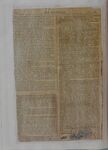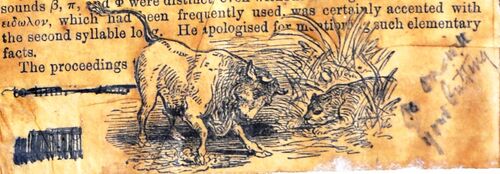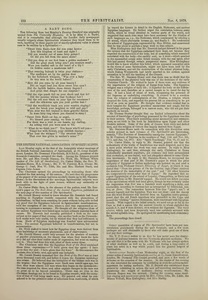Difference between revisions of "HPB-SB-8-76"
m |
m |
(No difference)
| |
Latest revision as of 12:40, 10 July 2024
< Soul-ideas of the Ancient Egyptians (continued from page 8-75) >
Magic, so prominent in old Chaldæa and Christian mediaeval countries, traceable to an African or a Turanian source.
The diversity of opinions in Egypt testifies to the inquiring spirit of the people and the absence of dogmatic authority. The future fate of the soul was not so distinctly indicated in their Bible, but that men could speculate from chapter and verse as to what became of the spirits of the dead, in the same way as our theologians do.
But there is this difference. Some of our divines can find, as they consider, Scripture authority for non-immortality of soul. No materialist could quote texts from Egyptian writings in support of such a dogma, since they are at least clear upon continued existence, in some form, after death.
Still, these holy books were not precise, or our interpretation is obscure upon the condition of the soul. While certain passages favour the theory of eternal punishments, others point to a restoration after a course of trial. The phrase “gift of eternal life” occurs repeatedly, as if the gods made a special grant of immortality, according to the idea entertained by Mr. Dale, of Birmingham. At a later period the Pantheistic doctrine of absorption supplanted the original faith with the more philosophical class. Egyptians, like the moderns, indulged in speculation on such subjects, having no thought of the employment of experimental science to determine the question of intellectual being.
It is but natural that we should inquire into the origin of Egyptian soul-ideas, and how the notions of the nineteenth century A.D. were so accordant with those of, say, the thirtieth or even fortieth century B.C.
Some will assume these soul-ideas to be the remnants of an original revelation to the Egyptians, or to some earlier and now forgotten people.
Others suppose they grew with the gradual advance from barbarism. Men saw sunrise follow sunset, plant life spring from plant death, and so associated death of man with a reappearance somewhere. Mummies evidence a belief in the soul’s resurrection, and we have no knowledge of Egypt when these were non-existent. A belief in soul, as independent of body preceded, therefore, that preservation of the body. Whether this was 7,000 or 10,000 years ago, we have no means of determining.
The steady faith, in the vastly remote Pyramid days, that the dead would rise again, must have given hope to the dying and joy to the bereaved, while affording a motive for the exercise of virtue on earth. A gradual decline of morals in Egypt would seem to have accompanied the gradual departure from the simple soul-ideas of more primitive times.
The British National Association of Spiritualists
Last Monday night, at the first of the fortnightly winter meetings of the British National Association of Spiritualists, at 38, Great Russell-street, London, Mr. Desmond Fitz-Gerald, M.S.Tel.E., president of the Research Committee, occupied the chair. Among the listeners present were Mr. and Mrs. Gerald Massey, Dr. Wyld, Mr. William White (author of The Life of Swedenborg), Dr. Carter Blake, the Rev. W. Stainton-Moses, M.A. (Oxon.), Mr. F. W. Percival, M.A. (Oxon). Mr. George C. Joad, Mrs. W. Tebb, Mr. and Mrs. Herbert Stack, and Captain John James.
The Chairman opened the proceedings by welcoming those who attended the first meeting of the session. He said that the programme of the papers of the session had been carefully drawn up by Mr. Stainton-Moses; in the discussions at the meetings, Spiritualistic subjects were dealt with in the light of pure reason, without any animosity or personalities.
Dr. Carter Blake then, in the absence of the author, read Mr. Bon-wick’s paper on The Soul-Ideas of the Ancient Egyptians, published on the next page of this number of The Spiritualist.
Mr. Gerald Massey wished to know whether Mr. Bonwick had found anything in Egyptian records connected with the phenomena of Spiritualism; he had been searching for years without being able to find any proof that the Egyptians believed in Spiritualistic manifestations, with the exception of one case, where a soul was represented as returning to reanimate a mummy. He thought all the religious ideas of the ancient Egyptians were based upon certain ordinary material facts of nature. Mr. Bonwick had recently published a book on the same subject as his paper of that evening; also another book on the Pyramids: both works were very useful, but he wished that they had references in them. Much of Egyptian mythology was founded upon astronomical facts. The ancient Egyptians believed in transformation, but not in reincarnation.
Dr. Wyld wished to know how far Egyptian ideas were derived from their knowledge of mesmeric phenomena, and of clairvoyance.
Mr. Gerald Massey could only account for the absence of mention of psychic phenomena, on the theory that when they knew the facts they did not alter their earlier mode of expression, but went on reading into it. They had done this with other of their newer ideas.
The Chairman said that the Egyptian Book of the Dead contained these three expressions:—“I have given thee thy spirit: I have given thee thy soul: I have given thee thy force.” In this sentence the modern idea of body, soul, and spirit was included.
Mr. Gerald Massey remarked that the Book of the Dead was at least seven thousand years old, and before it began the Egyptian mythology was extant. He believed that the birthplace of the human race was in the tropics; that the Egyptians were black men untold ages ago, but that they were almost red men when they began on the monuments; the time required for these and other organic changes in the race was so great as to be beyond calculation. There was no idea in the Christian theology not to be found in Egyptian records, with the exception of that of God being made man. He pointed out what he considered to be the primitive order of inflections from word-roots, of which he traced the history in detail in the English, Hottentot, and ancient Egyptian languages. He further urged the correlation between many words, which he found identical in various parts of the world, and suggested that much time must have been necessary for the filiation of such languages as, e.g., the Hottentot, which commenced by uttering a ph sound, which afterwards became pp, and finally b. He condemned the school of Egyptologists represented by Max Muller, and announced that he was about to publish a large work on that subject.
Miss Kislingbury said that Mr. Bonwiek had put forward in his paper the opinion that the Egyptians embalmed their dead, not because they expected the resurrection of the body, but of something which remained associated with the body—the earthly soul, as it were—which awaited in the mummified corpse some future reunion with the real spirit, after this had passed through certain purgatorial states. Miss Kislingbury would like to know whether this belief, which appeared somewhat akin to the views of some Spiritualists, might not have been held by the early Christians, and not the resurrection of the actual physical body, which Bishop Wordsworth had lately asserted in his sermon against cremation to be still the teaching of the Church.
The Rev. W. Stainton-Moses said that there was no doubt that the resurrection of the physical body was one of the doctrines of the early Christian Church. He wished to know if there were any evidence of the importation of the religion of Egypt from India. The Egyptian religion was a religion of daily life; it regarded the body as the habitation of the soul, therefore as a sacred temple to be cared for day by day. It had a kind of ritual of work, recognising the presence of the Supreme as underlying everything. It seemed to be a reaction from the religion of contemplation of the Hindus, a religion which despised the body, and regarded the present life as something to be got rid of as soon as possible. He thought that evidence existed that in their temples the Egyptians practised mesmerism and magic, but the knowledge, perhaps, belonged to a narrow caste, who did not put their methods on record.
Mr. Thomas Shorter thought that our limited information about the amount of knowledge of psychology possessed by the Egyptians was due to their secrecy. They knew something about mesmerism and entrancement, as set forth in the book by Iamblichus upon Egypt and other Eastern nations. Some of the gods of Greece were risen and deified men, and the religion of Greece was largely derived from Egypt.
Mr. Stainton-Moses said—In connection with this discussion some articles printed in back volumes of The Spiritualist are interesting, namely, “The Doctrine of Immortality among the Ancient Egyptians,” by M. Constant, of Smyrna, in the numbers of Sept. 11th and Nov. 6th, 1874, and Jan. 1st, 1875. Also “Spirit Teachings,” Nos. 42, 43, and 44.
Dr. Carter Blake, in reply to Mr. Shorter, pointed out that the authenticity of the works of Iamblichus was much disputed, and it was a moot point whether the work was very ancient. In reply to Miss Kislinghury, he said that, although the early Christians at Rome undoubtedly practised sepulture, yet evidence had been accumulated that cremation, or urn-burial, was not altogether absent in some Christian interments. In reply to Mr. Stainton-Moses, he recognised the importance of that part of Mr. Bonwick’s paper in which the prior antiquity of Egyptian to Indian mythology was insisted on, and read a quotation from Professor Owen’s Ethnology of Egypt, in which it was stated that “From the priests of On the Grecian sage (Plato) received the doctrine of the immortality of the soul and “All other histories are comparatively recent after that of Egypt.” He regretted that no expert Egyptologist of the school of Lepsius, Champollion, or Birch had addressed them on Mr. Bonwick’s paper. He would not follow out some of the speculations which had been given, though he was certainly under the impression that Dev was a Sanskrit word signifying a deity, and convertible, according to German law as interpreted by Schleicher, into θεος, or Deus. The connection between Tom (the “piper’s son”) of nursery legends and the Egyptian Turn was not clear; and the theory that the word Hottentot was derived from an Egyptian source presupposed that the old Dutch travellers who proceeded to the Cape, and named the “clicking” natives Hottentots, were conversant with Egyptian literals. With regard to the labial sounds, we need not go so far as the Cape to find a nation like the ancient Greeks, in whose alphabet the sounds β, π, and Φ were distinct, even without the digamma. The word ειδωλον, which had been frequently used, was certainly accented with the second syllable long. He apologised for mentioning such elementary facts.
The proceedings then closed.
Editor's notes


